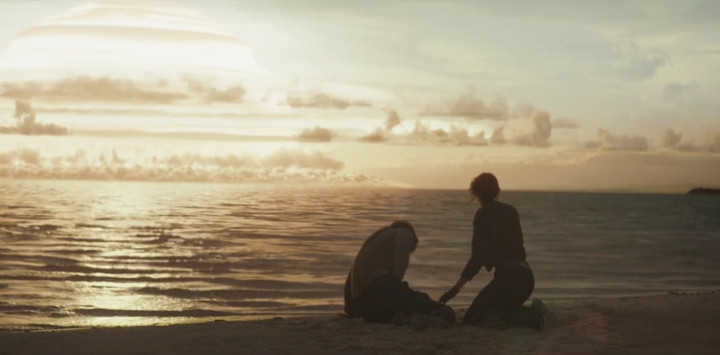
Of all the undue compliments that have been thrown at Rogue One: A Star Wars Story, the most absurd might be that its ending was ballsy or risky in some way. I guess this is because everybody dies at the end?
But is this really risky in this day and age? And is this really new for Star Wars? The answer to both of those questions is “no.”
Killing Major Characters is en Vogue Right Now
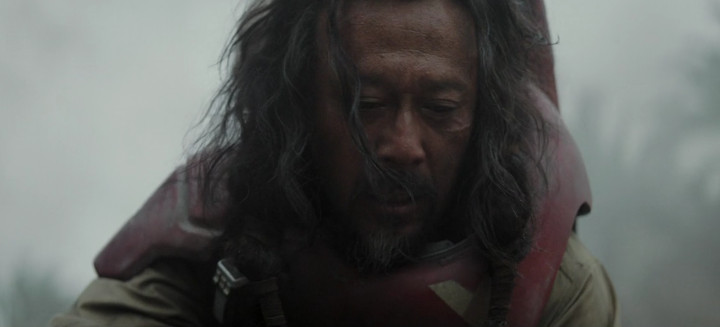
Ever since Lost, television dramas have been pretty willing to kill off their major characters. Audiences love it. From The Walking Dead to Breaking Bad to Game of Thrones, many of the biggest TV shows in recent memory are the ones where you never know who’s going to make it to the finale alive. Rogue One could very safely apply this formula to the Star Wars universe because it had already been proven to drive numbers and fuel passionate watercooler conversations. In 2016, there was nothing risky about it.
Disney Has Never Been Afraid to Kill Characters, Even in the Cartoons
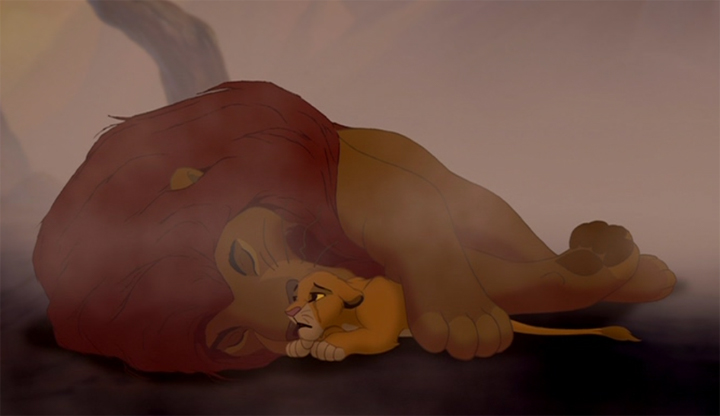
I don’t know where people get the idea that Disney is squeamish about death. Remember that the third Pirates of the Caribbean movie began with a mass hanging — which included children.
Even the animated features don’t shy away from death. Remember Bambi’s mom?
Or how about Mufasa? Now there was a risky death scene. We see a child cuddle with his father’s corpse as he tries to understand — truly understand — what death is all about. Then he’s told he’s responsible for the death, which he believes well into adulthood, and that has consequences for the rest of the film. That’s pretty dark for an animated feature, right?
Rogue One isn’t pushing any boundaries with the House of Mouse by killing off its characters. It’s been done before, and it will be done again. In the words of that one Stormtrooper in A New Hope (you know the one), “Move along.”
Rogue One Isn’t the First Star Wars Movie Where Everybody Dies at the End
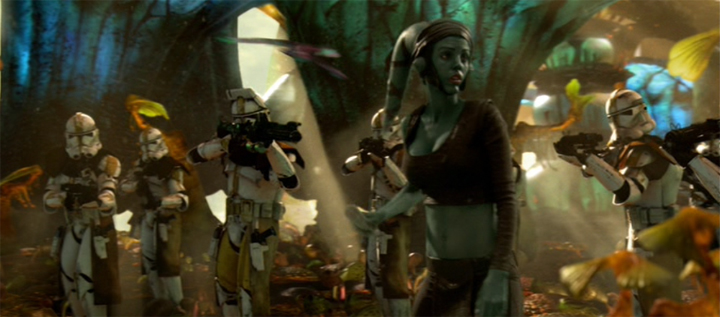
People talk about the body count at the end of Rogue One like it’s new to the Star Wars film franchise. These people have clearly forgotten Revenge of the Sith (though I can’t really say I blame them).
Toward the end of the film, the Clone Troopers kill every living Jedi, including the children. The only exceptions are Yoda and Obi-Wan, both of whom survive their assassination attempts — Yoda by neatly decapitating two Clone Troopers at once, and Obi-Wan thanks to a little hand-waving by the scriptwriters. (Anakin doesn’t count as an exception because he turned Sith before the assassination order was given, thus was guaranteed safety when all this was going down.)
You could also convincingly argue that a vast majority of the X-wing pilots died at the end of A New Hope, though none of them were major characters and the movie sort of glosses over all those deaths. They don’t really have much of an emotional impact.
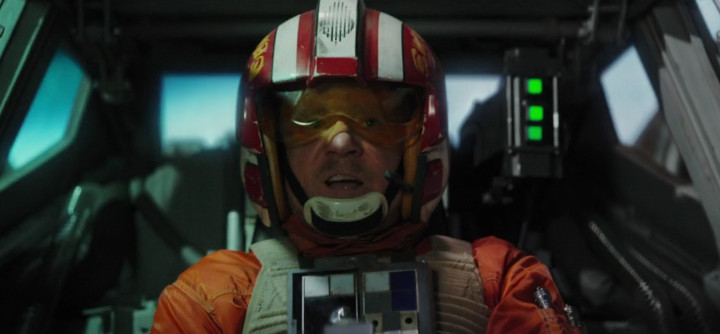
My point is that “everybody dies at the end” isn’t a premise that’s breaking any new ground for the galaxy far, far away.
Rogue One Isn’t the Darkest Star Wars Movie

I’ve heard the argument that Rogue One is the darkest Star Wars movie, or at least the darkest one since The Empire Strikes Back. But this really isn’t true. That honor would have to go to — again — Revenge of the Sith.
To reiterate the fact that the Jedi are all wiped out is just scratching the surface. Consider how they’re wiped out: they are mercilessly gunned down by the soldiers they’ve been fighting alongside for years. It was the ultimate betrayal by people they’ve undoubtedly formed familial bonds with.
But that pales in comparison to Anakin’s journey in this film. He leads the charge on the Jedi temple and murders all the children himself. He’s then confronted by Obi-Wan, who basically considers him a brother, only to have his limbs severed and turned to roast mutton in a lava flow. As he crawls helplessly toward Obi-Wan on the stumps that used to be his arms and legs, he catches fire and is roasted like a marshmallow held too close to a campfire. He’s very much alive through all of this.
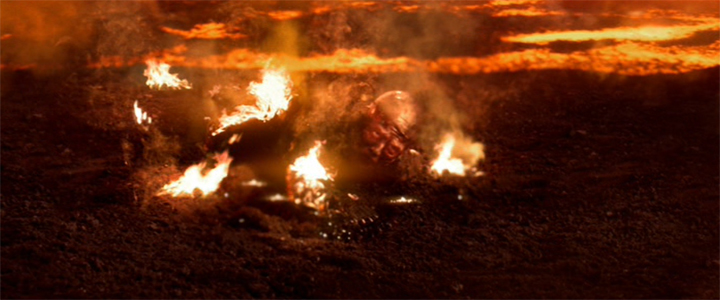
But the most horrifying part of this whole scene is the hatred that’s consumed him completely. He’s literally not even human anymore — he’s a hobbling torso of unadulterated hatred and anger. He has completely given in to the Dark Side, a move so emotionally powerful that even his intense physical pain pales in comparison.
And we even see this transformation have an emotional toll on Obi-Wan. Horrified at what he’s done, Obi-Wan is in tears over this man who he can no longer call a friend.
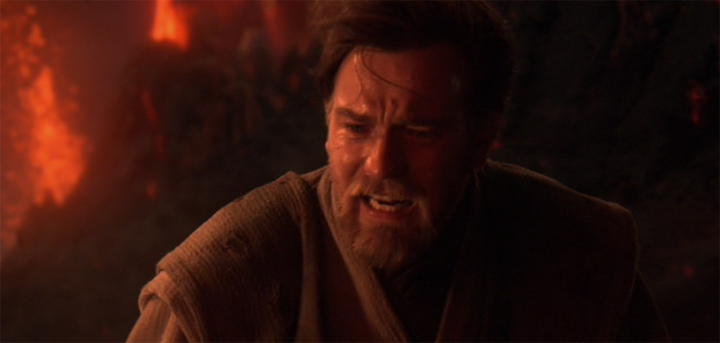
To make matters worse, Anakin’s wife Padme essentially dies of grief, abandoning her newborn twins — who must be hidden away from their father since he’s now basically the most malevolent person in the galaxy.
Now that’s dark. Rogue One is a barbershop quartet (or a pun-making cartoon supervillain) in comparison.
Killing off Major Characters Isn’t the Only Way to Make a Film Dark
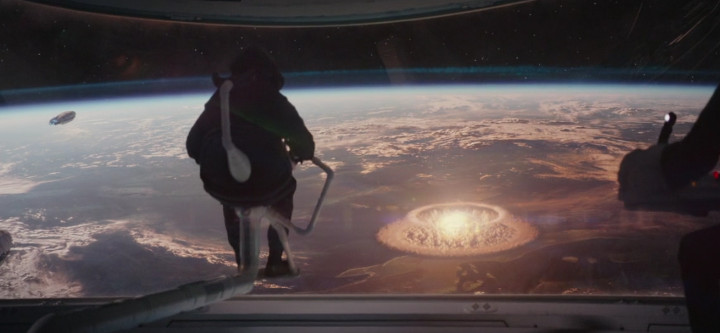
A lot of people still consider The Empire Strikes Back to be the darkest Star Wars film. Note that it’s the only one that doesn’t kill off a fairly major character.
- The Phantom Menace kills off Qui-Gon Jinn and Darth Maul.
- Attack of the Clones kills off Shmi Skywalker (in a horribly brutal scene) and Jango Fett.
- Revenge of the Sith kills off basically everybody.
- A New Hope kills off Obi-Wan Kenobi, as well as Uncle Owen and Aunt Beru. Oh, and the entire planet of Alderaan.
- Return of the Jedi kills off Yoda and Darth Vader.
- The Force Awakens kills off Han freaking Solo.
So clearly, there are better ways to make a movie “dark” than to kill off its characters.
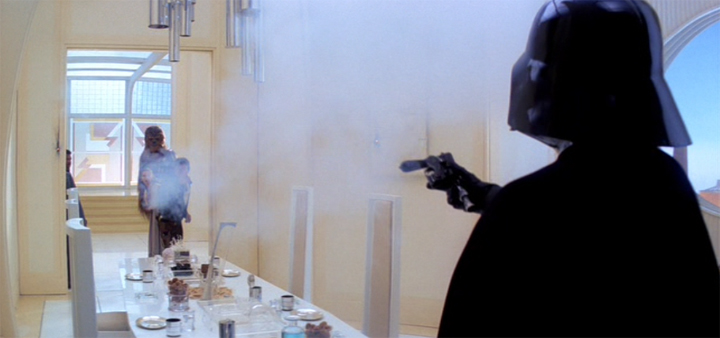
What makes Empire dark is its willingness to completely dismantle any of the previous movie’s titular hope. We see Luke’s half-frozen body shoved into the corpse of a tauntaun because it’s the only way to save his life; we see Lando betray Han Solo to Vader; we see Han get tortured; we see Luke forsake his training to tumble headfirst into Vader’s trap; we see Vader’s revelation that he’s Luke’s father; we see Luke’s severed hand go tumbling down the longest laundry chute in history. We end the film with Han frozen in carbonite, unsure whether we’ll ever see that lovable rogue alive again.
We have an emotional crescendo from the thrill ride of A New Hope to a film that’s less afraid to confront real human turmoil. We transition from the Rebellion winning a major victory to being perpetually on the run from the Empire. The hope that carried the first film is almost completely stamped out, left in tatters that Return of the Jedi must then attempt to patch up.
The Empire Strikes Back is a dark film, but it doesn’t rely on a high body count to make it so. It’s dark because it explores some of the more uncomfortable elements that lurk beneath the surface of its own universe — something that Rogue One fails to do, regardless of how many Rebels die on Scarif.
Characters Who Die at the End Still Sell Merchandise
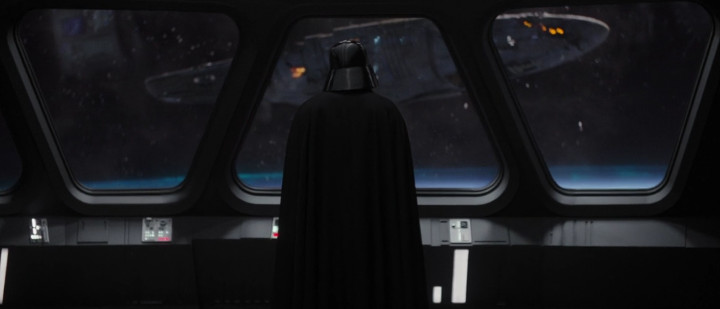
An absolutely absurd argument I heard from a friend was this: “You can’t sell action figures when your characters die at the end.” I’m not sure what universe this friend is living in, because the most marketable character in Star Wars history dies at the end of Return of the Jedi (I’m talking about Darth Vader, in case you still haven’t guessed it by now).
Besides, if you go to the toy aisle at your local department store, you’re going to find Rogue One figures. I promise you, they’re not difficult to acquire.
So there was never any risk of losing merchandise sales over Rogue One‘s ending, and even if there was, Disney will be making fat stacks of Vader cash for decades. It’s not like Rogue One‘s script was an all-or-nothing gamble that would have long-term merchandising repercussions. There was actually very little at stake here.
In fact, I would argue that Kylo Ren’s unmasking in The Force Awakens was riskier for merch sales than anything Rogue One did (but that’s a different conversation entirely).
Letting Jyn Survive Would Have Been Riskier Than Killing Her Off
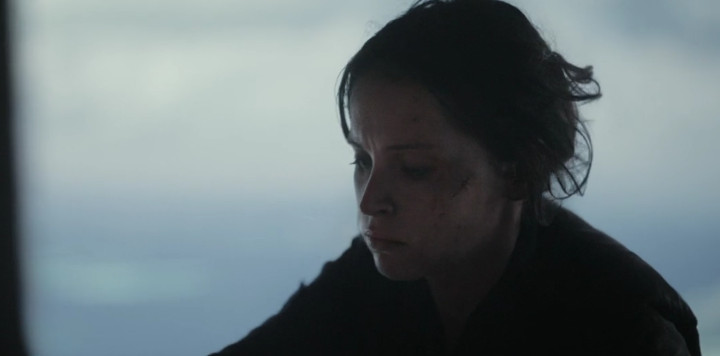
Jyn could have lived. In fact, Rogue One might have been a better movie if she had.
Consider this: What if Jyn’s entire motivation was to prove to the Rebels that her father was not a war criminal, to prove him innocent posthumously? What if she didn’t give a womp rat’s ass about the Rebellion? In an ending where she survived, she could look Mon Mothma in the eyes and say, “Good luck with your rebellion, but my work is done.” And then she’d walk off, presumably to return to a life of low-level crime against the Empire.
Han Solo almost did this in the original trilogy, but he came back for his friends. All of Jyn’s “friends” are dead, so she would have no reason to keep fighting unless she believed in the Rebellion. Which, in the version of the script I’m imagining right now, she didn’t.
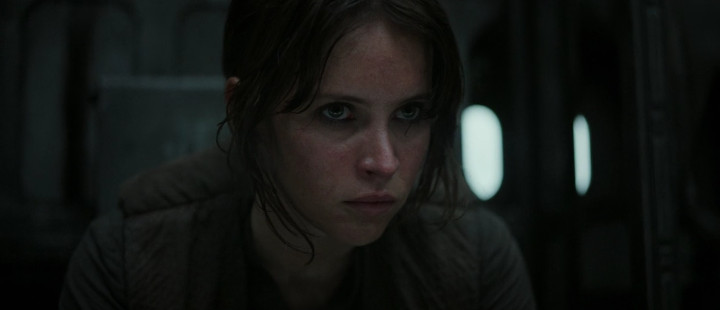
This would have given her character some dimension. Instead of chasing a suicide mission because her father told her to, she’d have her own reasons for needing those plans — a deep, driving need to redeem her father’s legacy, not because he asked her to but because she cares that deeply. Seeing her walk away from the Rebellion — never to be seen again — would have been a pretty badass move, one that could have forever cemented her place in the pantheon of memorable Star Wars characters.
Was it moral ambiguity that Disney was afraid of? Because moral ambiguity can certainly be risky. Killing Jyn off was much, much safer.
Having Bodhi Survive Would Have Been Even Riskier
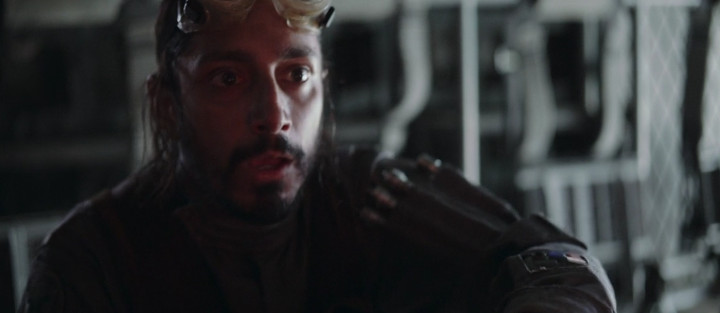
If you want your audience to remain satisfied in their popcorn grease-stained theater seats, one thing you’ll want to avoid is presenting a complex and tragic issue in such a way that you’ll trigger an uncomfortable discussion.
Just imagine if Bodhi survived, but his mind was too far gone to be useful to the Rebellion? (Of course, then the movie would have to be consistent with Bodhi’s mental health, which it fails to do.) Keep in mind that he was a pilot who defected from the Empire, only to have his mind destroyed by the Rebellion (well, by Saw, whose place in the Rebellion is up in the air at this point). He loyally served the Rebellion regardless, and is doomed to be forgotten once his usefulness (in acquiring the Death Star plans) has expired.
Even by those with the best intentions, the mentally ill have a tendency to be pushed aside. This is a real issue, and seeing it presented in a Star Wars film would have been an incredibly risky move for Disney. But society’s treatment of the mentally ill is not the stuff Hakuna Matatas are made of.
No, killing of Bodhi was a lot safer.
There Was Never a Compelling Reason for the Empire to Blow Up Its Base on Scarif
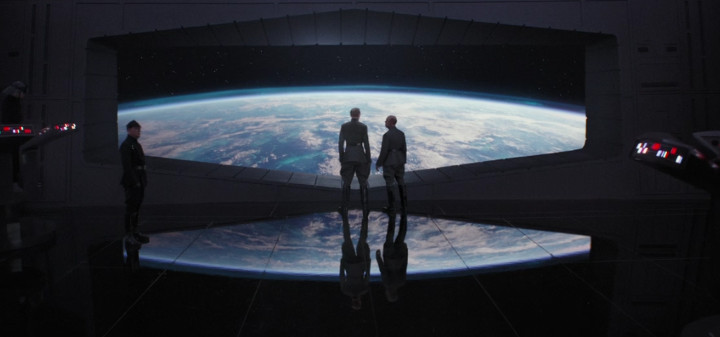
One of Rogue One‘s pivotal moments is when CGI Tarkin gives the order to blow up Scarif. It leads to some neat imagery, I suppose, but it makes absolutely no sense from a storytelling perspective. The call was completely idiotic — it was a plot element that forced a completely rational character to act irrationally in order to make a thing happen that one of the writers thought needed to happen.
Had the base on Scarif not been obliterated, the Empire could have looked at its own database and seen what the Rebels had accessed. Had they done so, they would have been taken directly to the Death Star plans and they’d have found its weak spot, which they could have fixed.
Also, did the Empire really not have a backup set of Death Star plans? And if they did, why wouldn’t they have inspected it to see why the Rebels wanted it so badly? Had they simply done this, they would have found its weak point.
Now, I’ve heard it argued that the Empire blew up the planet to save the data from falling into Rebel hands. However, in order for this to be their actual motive, they would have had to have known that the Rebels were on Scarif specifically to steal the Death Star plans. If they didn’t know that, there would be no reason to blow up the planet. And if they did know that, then they should also have checked out that data to see why the Rebels wanted it so badly — which would have led to them, yet again, discovering the Death Star’s weak point.
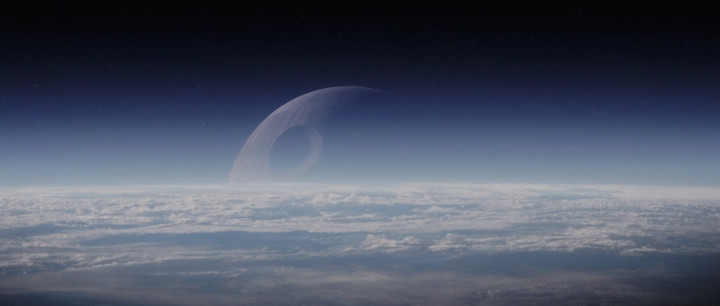
You could also argue that Tarkin blew up Scarif out of ambition: it was a clear way to eliminate Krennic and wrest the Death Star out of his whiny little hands. But this doesn’t really make sense either. Had the Empire realized the mistake before they let a swarm of X-wings bring down their battlestation, Krennic would have been done for anyway; it’s a pretty huge blunder that happened under his watch. Tarkin’s cool demeanor through Rogue One and A New Hope suggests a rational mind and a hell of a lot of confidence, not an insecurity deep enough to blow up one of the Empire’s own bases — dooming the Death Star in the process — simply to eliminate a rival.
So the Empire is portrayed here as doubly incompetent. Firstly, by blowing up a major repository of documents which were apparently incredibly important, and secondly by not keeping a backup of any of that data.
That seems like a plot hole far larger than the Death Star’s exhaust port.
The Film Candy Coated Its True Darkness
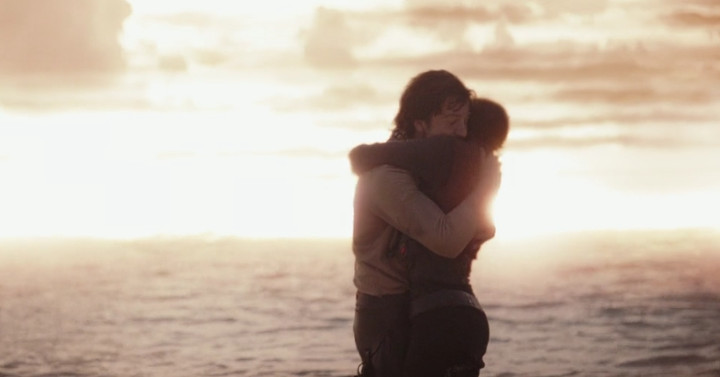
If you were sold on the premise that Rogue One was supposed to be a gritty war film set in the Star Wars universe, then you probably felt a little ripped off that it didn’t commit to that. While yes, it showed us a motley group of Rebels on a suicide mission, it didn’t do anything with themes like sacrifice, honor, and the way the battlefield affects a person mentally and emotionally — which any gritty war movie should do.
Now, before you shout at me about how the entire ending was about sacrifice, I’ll point out that the Rebels’ sacrifice was superficial, because no one went into this expecting to die; the only reason they all had to die was because Tarkin hit the idiot button.
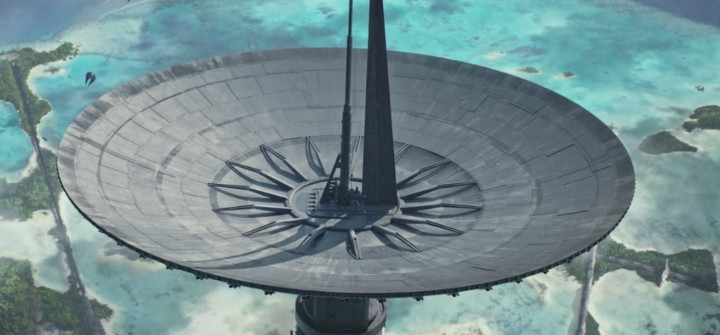
The ending would have been far more effective if, at the very end of the mission, the Rebels on Scarif would have realized the one thing they overlooked: the Empire is going to comb the data and find out what they had stolen. What would have been a celebratory moment turns dark as they realize they must go back and wipe the data. The only surefire way to erase their steps is to blow everything up. They take a vote, and each character sits mortified under the weight of this decision for a hefty few seconds before they unanimously decide to go for it. They all know they are willingly marching toward death, but that it’s the only way to be sure the Empire doesn’t figure out what they’ve done.
This way, the characters have agency, and their sacrifice is intentional and heroic — as opposed to an accidental result of an idiotic decision by Tarkin.
Instead, we have two characters cuddling on a beach in an atomic sunrise, which is as romanticized a death as I can think of. Calling this dark is akin to agreeing with that teenager on MySpace circa 2005 who insisted My Chemical Romance lyrics are dark because that’s what it means when dudes in a band wear eyeliner.
There Are No Stakes
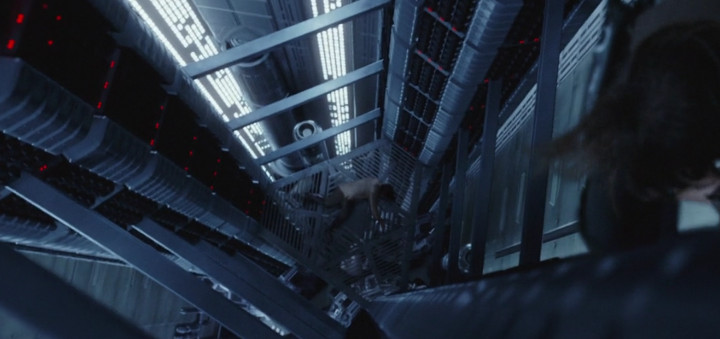
This has been said before, so I won’t delve into it too deeply. Simply stated, we go into Rogue One knowing that the Rebels are going to acquire the Death Star plans, and that any new characters we meet are unlikely to return. Whether those characters live or die, the impact on the Star Wars universe as a whole is null.
On top of that, Rogue One doesn’t make us care about its characters. Even the introductions are sloppy, and the character writing never really gets any better as the movie progresses. If, say, Cassian were irresistibly charismatic, perhaps we’d be weepy-eyed to see him bite the big one. But he’s not, so we really don’t.
Besides, he “dies” twice in the movie, and the second time (the cuddly one) comes after we’ve already grown bored of seeing characters get snuffed out. There’s just nothing left to emotionally connect with.
I could go on and on and on, but I think I’ve made my point. Rogue One‘s ending was never a risk for Disney’s pocketbook or for the Star Wars universe. It didn’t do anything new, and the thing it actually did was poorly handled and sugarcoated.
Perhaps we’ll see Star Wars attempt to do something really ballsy in the future, but it certainly wasn’t willing to do so with Rogue One.
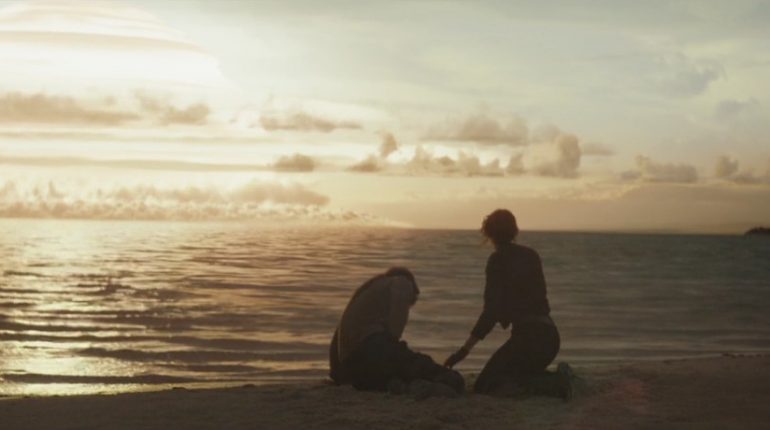
-Touch grass and hit a gym lil’ bro🤡